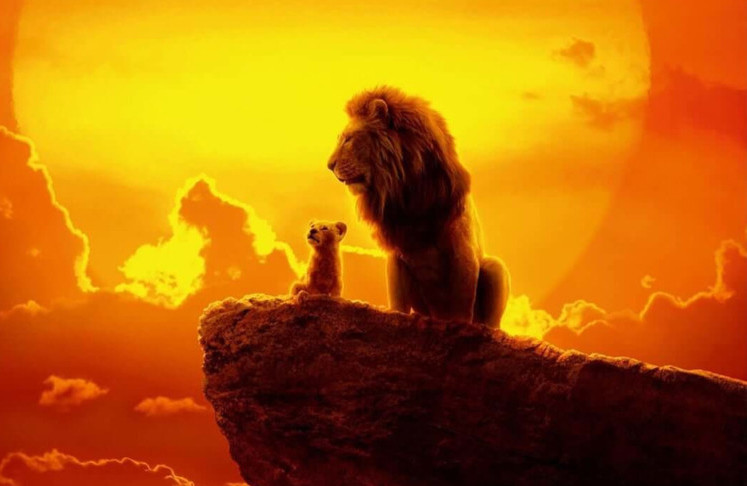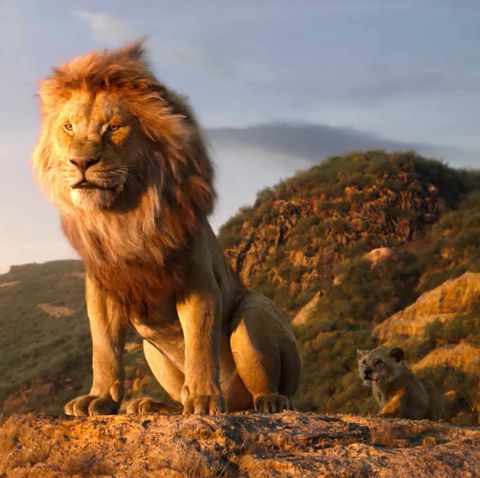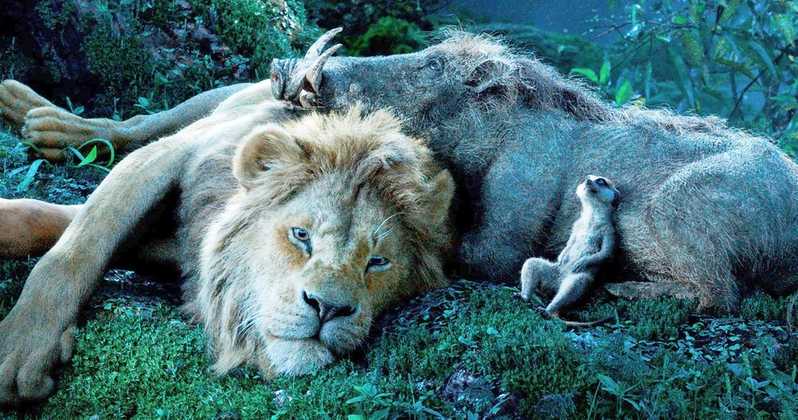The Lion King (2019)

DIRECTOR: Jon Favreau
CAST: voices of Donald Glover, Beyoncé Knowles-Carter, Chiwetel Ejiofor, James Earl Jones, Seth Rogen, Billy Eichner, John Oliver, John Kani, Alfre Woodard, Florence Kasumba, Keegan-Michael Key, Eric André, J.D. McCrary, Shahadi Wright Joseph
REVIEW:
Considering Disney’s recent noxious trend of remaking its own animated classics with less-than-classic scene-by-scene regurgitations, it was virtually inevitable that The Lion King would be included. The Lion King is generally considered the “king” of the Magic Kingdom’s fleet of animated movies, arguably only rivaled by Beauty and the Beast, and now, following Kenneth Branagh’s Cinderella, Jon Favreau’s The Jungle Book, Bill Condon’s Beauty and the Beast, and Guy Ritchie’s Aladdin, the lion roars again, this time in CGI rather than hand-drawn animation form. Of all these remakes, The Lion King is probably the best, partly simply because it’s a remake of the one that had the best story in the first place, partly because it is visually splendorous. However, a surfeit of eye candy can’t entirely overcome a slightly hollow feeling, like a competent but uninspired cover of a classic song.
We follow the original in scene-by-scene and frequently word-for-word fashion, with not a surprise of any significance to be found. For anyone uninitiated, the story follows lion cub Simba (J.D. McCrary), the young son of Mufasa (James Earl Jones), the stern but just ruler of the Pridelands, who teaches him about the delicate balance of the “Circle of Life”. But meanwhile, Simba’s bitterly jealous uncle Scar (Chiwetel Ejiofor) lurks on the sidelines, and when Scar’s treachery—and alliance with a band of hyenas—leads to Mufasa’s death and Simba’s exile, the cub falls in with another pair of misfits, the meerkat Timon (Billy Eichner) and warthog Pumbaa (Seth Rogen), who teach him a different life philosophy: “Hakuna Matata”—no worries. Meanwhile, Scar and his ravenous hyena enforcers are razing the Pridelands to the bone, but Simba grows up (now voiced by Donald Glover) in carefree isolation, until a chance reunion with childhood friend Nala (Beyoncé Knowles-Carter) spurs a return home to face the past.

On a purely visual level, The Lion King is an unqualified triumph. While there’s a credited cinematographer (no less a personage than Caleb Deschanel), and some real background shots, the vast majority of what’s onscreen is the product of CGI (making it a bit flimsy when the movie touted itself as “live-action”), but there’s times when it’s hard to tell, with the animals often looking as real as a David Attenborough nature documentary. The “Circle of Life” opening sequence is a shot-for-shot identical recreation, and various other shots, like Simba and Nala frolicking behind a waterfall, or running through the desert, are visually striking. Some of the same crew and one cast member are still onhand; not only did James Earl Jones return as Mufasa (reciting mostly the same dialogue as he did twenty-five years ago), composer Hans Zimmer also returned to slightly rework his music. All of the original songs written by Tim Rice and composed by Elton John are present and accounted for (Elton John also sings a forgettable little ditty, “Never Too Late”, for the end credits), although some will be disappointed to find that Scar’s number “Be Prepared” has been chopped far down and is performed mostly as a spoken word monologue. There’s other slight variations; “The Lion Sleeps Tonight” is a little longer and more elaborate, and as comes as no surprise to anyone, Beyoncé got to write and sing her own original song, “Spirit”, making this regurgitation of a twenty-five-year-old movie eligible for the 2020 Academy Awards Best Song competition.
On the downside, the photorealism of the animals, while highly impressive from a technical standpoint, has its drawbacks as well. While the inherent unrealism and exaggerated nature of a cartoon makes it easy to accept things like animal characters breaking into musical numbers, there can occasionally be a weird disconnect when realistic-looking lions are doing it. Likewise, a realistic lion’s inherent lack of emotional expressiveness limits the effect of some scenes. Consider the original stampede from 1994, with the camera zoom-in on Simba’s eyes bulging in horror, or the look of realization and betrayal dawning on Mufasa’s face before he’s thrown to his doom. The inexpressive faces of more realistically-rendered lions disallows little moments like that, and it makes a difference in the amount of emotion that’s conveyed. The death of Mufasa is not as tear-jerking as it was in 1994, and the way his “ghost” visiting Simba is visualized here, as a disembodied voice in a storm cloud rather than his face appearing, God-like, is underwhelming. While an inherently stronger and more compelling story and a smorgasbord of eye candy keeps The Lion King afloat more than Guy Ritchie’s terminally bland Aladdin, it doesn’t entirely escape the same feeling of watching an expensive cosplay. Like Aladdin, this version runs about half an hour longer than the original, and like Aladdin, it’s hard to tell where the extra time went. Even more so than Beauty and the Beast or Aladdin, this is a shot-for-shot recreation that exceedingly rarely strays away with any noticeable significance, and the couples times it does (like Scar trying and failing to make Simba’s widowed mother Sarabi his Queen), the new additions don’t amount to much.

Donald Glover and Beyoncé Knowles-Carter sing capably but their line delivery is a little flat (one could argue J.D. McCrary plays the young Simba with more spark than Glover shows as the grown-up). Simba and Nala’s romance is rushed and perfunctory, but the same was true of the original. Chiwetel Ejiofor imbues Scar with suitably snarling menace, but lacks the sly wit and delicious scenery-chewing that made Jeremy Irons such a distinctive presence, leaving his more straightforwardly brutish Scar feeling a bit watered-down into a generic villain. Nor does Mufasa have the same forceful effect, despite being the only character voiced again by the same actor; maybe it’s advancing age, but eighty-eight-year-old James Earl Jones lacks the same power in his voice that he had in 1994. Seth Rogen and Billy Eichner are fine as the two-man comedy act of Pumbaa and Timon, and worthy replacements for the original Ernie Sabella and Nathan Lane. In fact, one could make the case that they do the most to liven things up due to Favreau reportedly encouraging them to bounce improv and ad-libs off each other (they also throw in an in-joke reference to another Disney classic) in a movie where everyone else is mostly relegated to reciting the same dialogue that was already delivered, and sometimes delivered better, by other actors twenty-five years ago (this is especially true in the case of Jeremy Irons versus Chiwetel Ejiofor). There’s not that much of a difference between John Oliver and the original Rowan Atkinson as the fussy toucan Zazu, but the hyenas are not as effective comic relief as the originals; their leader Shenzi (Florence Kasumba) is played more straight and initially seems to be set up as a more menacing secondary villain, but not much is done with this—-the filmmakers throw in a tussle between she and Nala in the climactic battle, but it lasts about ten seconds before we move on—-and her two bumbling henchmen (voiced by Keegan-Michael Key and Eric André) swap some not particularly amusing banter and are just kind of “there”. John Kani and Alfre Woodard are perfectly-cast as the shamanistic mandrill Rafiki and Simba’s mother Sarabi, but don’t get much to do (like Scar, Rafiki has been reduced from his original self).
At the bottom line, a visual triumph only partially compensates for a sometimes flatter shot-by-shot recreation of an already classic film. The Lion King is unquestionably often involving—more than the recent Aladdin, at any rate—but not enough to alleviate my misgivings about Disney’s reliably profitable but cynical and creatively bankrupt self-cannibalization, counting on nostalgia to drum up more big box office profits by throwing its whole catalogue of animated classics back onto the big screen with a new live-action and/or CGI coat of paint. It’s visually great but lacking that certain extra something. Ultimately, I grant it a somewhat grudging three stars, because it’s a competent retelling of a good story, and for its unimpeachable technical and visual accomplishments, but for The Lion King, praise shouldn’t have to be grudging.
* * *